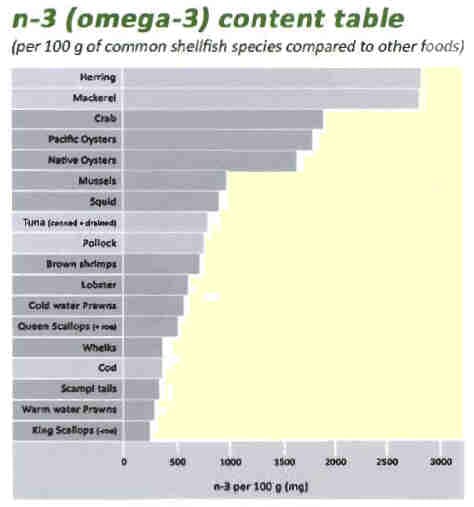Commonly food authorities and nutritionists say that for healthy diet requires cutting down on fat - especially saturated fat - salt and added sugars.
They also advise a diet should contain at least two portions of fish a week. For instance a joint report from the Scientific Advisory Committee on Nutrition in the UK and the Committee on Toxicity recommend two portions of fin fish.
However, they do not consider shellfish in the report.
Now the Shellfish Association of Great Britain has brought out its own report showing that shellfish are equally full of omega 3 fatty acids and contain other benefits.
"There is a lot of evidence that is given out by health professionals that is not correct," said Dr Tim Pickerell, director of the Shellfish Association of Great Britain.
Dr Pickerell added that many results of studies looking into the benefits of shellfish are highly technical, so the association has published its own report to address the needs of the public, policy advisors and decision makers.
In the SAGB study, Dr Pickerell says they acted to address the inequality by carrying out a comprehensive review of all the health benefits of eating shellfish. They have been published in a fully referenced technical report for the health professionals and policy makers and an easy to understand guide for consumers.
The report shows that shellfish are among the best possible dietary source of protein, containing as much protein per 100g as meat and the protein content is high in essential amino acids and is highly digestible because of the lack of connective tissue.
As well as the amino acids - some shellfish have nine - brown crab, mussels and oysters also have long chain omega 3 fatty acids, which are good for heart health and are comparable to those found in fin fish such as salmon.
The report shows that crab, oysters, mussels and squid only come below herring and mackerel for their omega 3 fatty acid content.

Shellfish are also low in fat and calories. A dozen oysters contains less than 100 calories and only 0.2g of saturated fat.
Most shellfish are lest than five per cent fat with many varieties having less than one per cent fat.
The report also shows that shellfish are a good source of trace minerals such copper, iodine and zinc. Cockles, oysters and mussels also contain iron and crab, octopus squid, lobster, shrimps and mussels also contain selenium. Most shellfish also have 10 per cent of the daily recommended daily amount of potassium in every 100g.
Finally, the report shows that oysters contain vitamin A, prawns vitamin E and shellfish are also a good source of the B compound vitamins.
Dr Pickerell also set out to dispel some of the advice that has been given out in the past by nutritionists that he said is either incorrect or out of date, including the concerns for pregnant women eating cooked shellfish and the fears of the cholesterol content of shellfish.
"Yes they do contain cholesterol, but it is the saturated fat content that is more important," he said.
"Eating prawns does not raise your blood cholesterol."
He said the claims have been backed by a peer-reviewed study by researchers at the University of Surrey.
As part of the marketing exercise, the Shellfish Association has also compiled a traffic light guide, based on the guides used on many food products in supermarkets to demonstrate the fat, salt and sugar content of shellfish.
While most shellfish had an amber light for the salt content, only crab had an amber light for fat content - but not saturated fats. All the others had a green light for fat and sugar content.
The marketing drive by the Shellfish Association of Great Britain is hope to dive up sales of shellfish in the UK.
In all the UK catches and grows 140,000 tonnes of shellfish a year although 106,400 tonnes are exported - 76 per cent of production - and most of the exports go to France and Continental Europe.
Shellfish accounts for a third of all sea food that is landed and half the value of the catch.
June 2010




